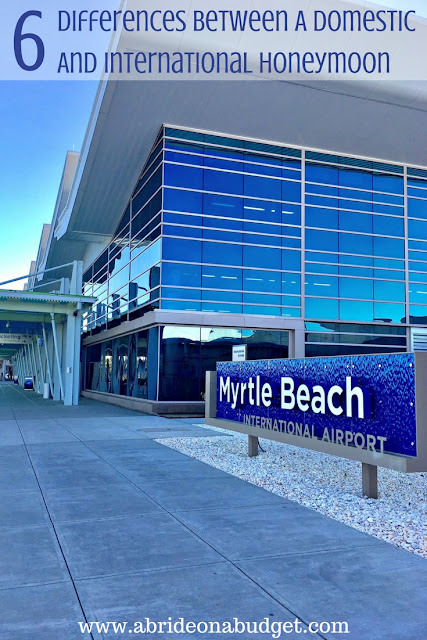Pete and I went to this amazing resort in Mexico on our first vacation together. It was probably the best vacation I've ever been on as a couple. Our most recent vacation together was to Hilton Head Island (which was more of a working vacation, actually, but we got a couples massage and there's no way to not feel like you're on vacation when you're getting one of those).
So we know a little bit about both domestic and international travel (especially Pete; before I met him, he both backpacked Europe and drove cross-country living out of his car). Hopefully what we know will help you decide.
6 Differences Between A Domestic And International Honeymoon
Since we are based in North Carolina, I'm considering domestic to be within the United States and international to be anything outside of the US. If you're reading this from anywhere outside of the US, things might be a little different for you.
Also, just as a catch-all: double check any of this information with the country or establishment where you'll be staying. There may be specific rules enforced that I don't cover here.
1. A passport.
If you're traveling within the United States, you can leave your passport at home. If you're traveling outside the country, you need a passport. And that includes if you're traveling to Canada and Mexico, depending on how you travel. You used to be able to walk across the border to Canada with a license, now you need at least a passport card.
If you're even toying with the idea of traveling internationally, double check your passport and make sure it is valid (or get a passport if you don't have one yet). You'll need to collect a few documents, including your birth certificate, plus passport-sized headshots, and head to a passport agency. Your passport will then be processed, and that can take time. You don't want to be stressed waiting for it.
And, if you decide last minute that you want to travel internationally, and you realize your passport is expired, you can expedite it. But that takes time, money, and isn't a guarantee.
2. You don't have to pay for luggage on international.
Your luggage allotment is different based on your airline carrier when you're flying domestic. Many include the cost of a carry on bag in your ticket price, but you have to pay additionally for any checked luggage. And then, of course, you have to worry about the weight of your checked luggage because if you go over, you have to pay more.
When you fly internationally, most ticket prices include the cost of a checked bag. Last time we flew to Japan, my grandma flew first class and she was able to check two bags for free (as long as they were under the airline's weight limit). So you can definitely pack all your cute clothes and shoes if you're going on an international honeymoon.
You can do that on a domestic one too, if you pay to check a bag, but you might be trying to shove everything into a carry on to save on costs.
3. Converting money.
If you're traveling somewhere internationally, you most likely have to change your money from dollars into the local currency. Of course, there are exceptions to this, but mostly, if you're traveling somewhere else, you'll need their money.
If you plan ahead of time, you can start watching exchange rates. We did this when we went to Japan. We monitored for a while before we actually decided to call our bank to exchange dollars to yen. You really want to exchange when the dollar is doing well so you don't lose out. Our bank will exchange money, which is a lot better than trying to do it at the airport. I've always found airport rates to not be as great as the bank.
If you don't spend all your money on your trip, you're going to have to change your money back to dollars. If you can afford to hang on to it until you get a good exchange rate to change it back, go for it. Most people can't afford to sit on foreign currency, though.
4. Are you insured?
You don't want to think about getting sick or hurt on your honeymoon. You just want to think about sipping a fruity drink by the beach. But the reality is people do get sick and injured on vacation. If you're traveling domestically, your insurance will usually cover you. But internationally? That's a different story.
And insurance doesn't just mean health insurance. Decide if you need any traveler's insurance and find out what it will cover. It does, often, cover trip cancellation or interruption. So if there is an emergency where you are and you have to evacuate, or if there is an emergency at home that you have to get back to, travel insurance should cover you.
5. What can you bring back?
The morning we flew home from Mexico, I grabbed some fruit from the breakfast buffet so we could have something to eat on flights. Well, there was a banana I didn't eat so when the customs form came around me being me, I declared a banana. Well, you can't bring fruit back from Mexico. Of course, I didn't know this and got stuck at customs.
It's not just fruit that you have to declare on your custom when you're flying internationally. You have to declare anything you've purchased on your trip and pay taxes when necessary.
If you're flying domestically, you don't have to declare anything on a customs form because you don't have to go through customs.
6. Customs.
When you're flying internationally, you have to go through customs. It's a little more involved than flying through a domestic flight. You have to provide your passport, speak with someone about your trip, and get an approval to enter the country.
Domestically, you just walk through the airport and you're on your honeymoon.
Customs always makes me nervous, even though I never have anything to be nervous about. I guess I just watch too much television.
BRIDAL BABBLE: What are your reasons for choosing between a domestic and international honeymoon?
Planning your honeymoon?
We have a few other posts for you to check out.
How To Prepare For TSA For Your Honeymoon Flight

















